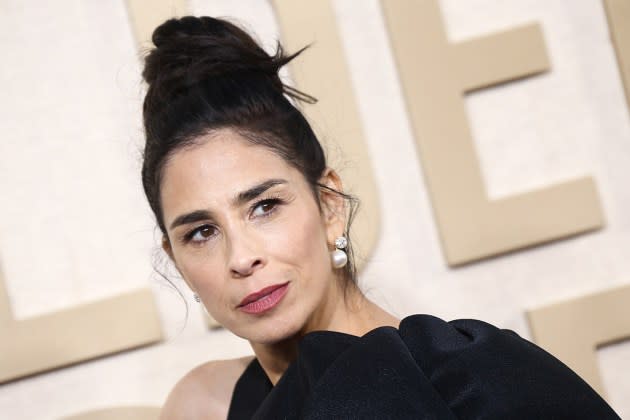Sarah Silverman, Authors See Most Claims Against OpenAI Dismissed by Judge

A federal judge has dismissed most of a lawsuit brought by Sarah Silverman, Ta-Nehisi Coates and other authors against OpenAI over the use of copyrighted books to train its generative artificial intelligence chatbot, marking another ruling from a court questioning core theories of liability advanced by creators in the multifront legal battle.
U.S. District Judge Araceli Martinez-Olguin, in an order issued on Feb. 12, refused to allow claims for vicarious copyright infringement, negligence and unjust enrichment to proceed against the Sam Altman-led firm. Following in the footsteps of another judge overseeing an identical suit against Meta, Martinez-Olguin rejected one of the authors’ main claims that every answer generated by OpenAI’s ChatGPT is an infringing work made possible only by information extracted from copyrighted material.
More from The Hollywood Reporter
Studios' Now-or-Never Choice: Sue AI Companies or Score a Major IP Deal
AI Threats Emerge In Music Publishers' Battle With Big Tech (Guest Column)
The New York Times Brings Receipts in Lawsuit Against OpenAI
The authors failed to cite “any particular output” that is “substantially similar — or similar at all — to their books,” the court explained. They were given leave to amend, meaning that they will have another chance to refile the suit. A claim for a violation of California’s unfair competition law was permitted to advance under the theory that the company’s use of copyrighted works to train its AI model for profit constitutes an unfair business practice. Notably, OpenAI didn’t move to dismiss a claim for direct copyright infringement.
The ruling builds upon findings from two other judges, also in the Northern District of California, who expressed skepticism as to whether creators can substantiate fundamental contentions in their suits in the absence of evidence of the AI tools generating answers that appear substantially similar to the works they are alleged to infringe upon. In a case between artists and AI art generators, U.S. District Judge William Orrick called the allegations “defective in numerous respects.”
The litigation could decide whether AI firms are forced to license the material they use to train their chatbots, as well as the fate of their tech. Some of the suits seek a court order that would require the companies to destroy their AI systems.
Among the most contentious issues is whether authors need to prove substantial similarity, the test used to determine whether a party has infringed on an existing copyright through a comparison of the works at issue. The authors maintain they do not need to because they are arguing that OpenAI directly copied their books to train its AI system.
In Monday’s ruling, Judge Araceli Martinez-Olguin sided with OpenAI and dismissed a claim for vicarious copyright infringement, meaning that the company knew about the alleged infringement and benefited from it. In the absence of allegations that ChatGPT’s answers contain direct copies of the copyright books through snippets or excerpts, she found that there must be a showing of substantial similarity between the chatbot’s outputs and the material allegedly used to train the AI system.
“Plaintiffs’ allegation that ‘every output of the OpenAI Language Models is an infringing derivative work’ is insufficient,” the judge wrote.
A claim for a violation of the Digital Millennium Copyright Act for removal of information — such as the title, author or terms and condition for use of a work — was similarly not allowed to proceed. The court concluded that there’s no evidence showing that OpenAI intentionally removed such information, rebuffing arguments that the company intentionally designed its training process to obfuscate infringement.
“Plaintiffs allege that ‘[b]y design,’ Defendants remove CMI from the copyrighted books used during the training process,” the order stated. “However, Plaintiffs provide no facts supporting this assertion. Indeed, the Complaints include excerpts of ChatGPT outputs that include multiple references to Plaintiffs’ names, suggesting that OpenAI did not remove all references to ‘the name of the author.'”
Claims for negligence and unjust enrichment were also dismissed. Araceli Martinez-Olguin found that OpenAI did not have a duty to safeguard authors’ works and that the suit failed to properly argue that the company benefited from fraud.
OpenAI, however, will have to face a claim for unfair competition under the theory that it used copyrighted books to train ChatGPT without permission or compensation.
“Assuming the truth of Plaintiffs’ allegations – that Defendants used Plaintiffs’ copyrighted works to train their language models for commercial profit – the Court concludes that Defendants’ conduct may constitute an unfair practice,” the order stated.
Although OpenAI did not raise the defense, the court noted that the claim may be preempted by the Copyright Act.
In a win for artists suing AI art generators, a federal judge found that the companies cannot avail themselves of a First Amendment defense arising under a California statute allowing for the early dismissal of claims intended to chill free speech.
Best of The Hollywood Reporter

 Yahoo News
Yahoo News 